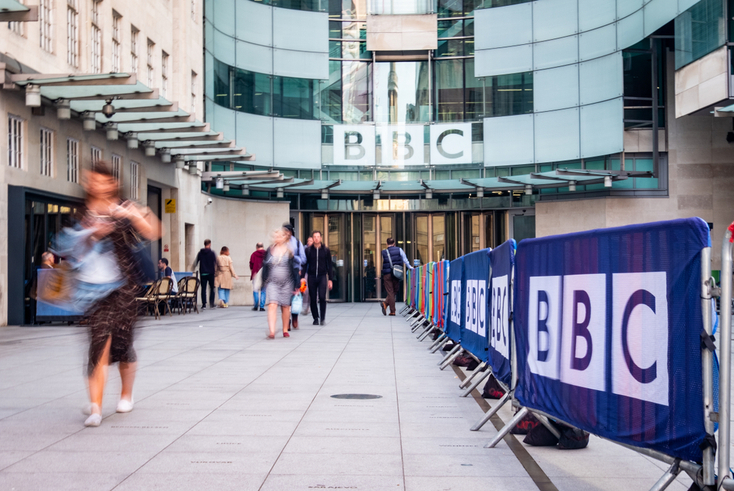Broadcasters are afraid to challenge the post-Brexit orthodoxy

Opinion
Despite the blindingly obvious failure of the entire Brexit project, the BBC, ITV, and Sky aren’t yet emboldened to challenge the new orthodoxy.
“Nobody at the BBC tells me what to say, or not say!” – Laura Kuenssberg, throwing shade at former colleague Emily Maitlis.
Last week saw an agreeable leak spring in the dam the BBC appears to maintain over the dire economic (and other) consequences of Brexit.
Licenced truth-teller Ros Atkins was allowed off the reservation to discuss Brexit in dispassionate, logical fashion.
Too Late the Hero?
Hurrah! I thought, as Sky News’ Sophy Ridge on Sunday saw the presenter confront Okie Cokie (‘In Out, In Out’) Secretary of State for Levelling Up, Housing and Communities and Minister for Intergovernmental Relations Michael Gove about the ‘B’ word.
Gove spun his usual old flannel on the subject (“a significant success”), but his heart clearly wasn’t in it, unlike his earlier appearance on Sunday with Laura Kuenssberg.
I’ve Started, So I’ll Finish
Presumably, Mike was tuckered out by his performance on the show, where Kuenssberg let him blather on for 30 minutes with nary a challenge.
Contrasting this with the interruption-filled eight minutes Laura devoted to Shadow Home Secretary Yvette Cooper, trotting out her usual excuse they were, “reaching the end of the show.”
So much for any chance of a late-stage Damascene conversion from Auntie, nutting up to the problems occasioned by the narrow vote from a minority of the actual voting population to leave the European Union.
Indeed, in the previous week’s LK show, the panel selected to discuss the coronation of Rishi Sunak as UK Prime Minister failed to include a single Opposition (Labour/SNP/Lib-Dem) voice, preferring former Bank of England boss Lord Mervyn King, political scientist Professor Jane Green and ‘Quiet Man of Politics’, failed former Tory Leader Iain Duncan Smith.
As former ‘Care in the Community’ PM Liz Truss would say, “That. Is. A. Disgrace.”
Don’t Mention The ‘B’ Word
Sadly, I fear that despite the blindingly obvious failure of the entire Brexit Project, the BBC, ITV, and Sky won’t yet feel emboldened to challenge the new orthodoxy.
Why?
Fear of offending the very vocal rump of Do or Die Brexit supporters, those deemed by oddballs such as GB News’ Darren Grimes as somehow representing the ‘Real Britain.’
This terror of being blindsided again by events akin to the 2016 vote led to the introduction by the BBC of the ‘Tim Davie Impartiality Doctrine’ where representatives of opaquely funded think tanks such as the IEA (Institute of Economic Affairs) are brought on as spurious ‘balance’ to reality-based facts.
I’m afraid it looks Atkins was a just a blip, especially in the light of the ubiquitous Amol Rajan shutting Max Hastings down the other day when he had the temerity to bring up Brexit being “unmentionable” on Radio 4’s Today (one of Rajan’s multiple Corporation gigs).
The irony of @amolrajan shutting down Max Hastings on @BBCr4today this morning when he said that the problem lay in Brexit having become unmentionable. Amol: “I don’t want to relitigate Brexit, the majority of the British public voted for it.” The BBC will not allow this debate.
— Jessica Simor KC (@JMPSimor) October 20, 2022
Add this to the propensity of Politics Live’s Jo Coburn to talk over anyone to the left of Genghis Khan; on 1st November it was Labour’s Angela Eagle’s turn to be shushed.
Incidentally, another guest on the show was from the IEA (yet again) – this time Emily Carver. When Eagle brought up the subject of where the ‘think tank’ got their money from, Coburn pointedly steered the conversation back to Carver’s patented brand of free market bunkum.
As the two other guests were Tory MP for Penistone and Stocksbridge Miriam Cates and Financial Times journalist Stephen Bush, it was yet another occasion when Tim Davie’s notion of ‘impartiality’ appears skewed distinctly rightwards.
Separately, and entirely as predicted in The Media Leader back in March 2020, where I listed the patently obvious reasons (including budgetary) why Spitting Image would fail to make an impression (sic) when revived by half-cocked streaming service BritBox, the show has been axed.
As with Tim Davie, the commissioning of Spitting Image v2 by BritBox Grand Fromage Reemah Sakaan amply demonstrates the perils of appointing a marketing executive to a senior editorial post.
 Stephen Arnell began his career at the BBC, moving to ITV where he launched and managed digital channels. He continues to consult for streamers and broadcasters on editorial strategy. He currently writes for The Spectator, The Independent, and The Guardian on film, TV and cultural issues. He is also a writer/producer (including Bob Fosse: It’s Showtime for Sky Arts) and novelist.
Stephen Arnell began his career at the BBC, moving to ITV where he launched and managed digital channels. He continues to consult for streamers and broadcasters on editorial strategy. He currently writes for The Spectator, The Independent, and The Guardian on film, TV and cultural issues. He is also a writer/producer (including Bob Fosse: It’s Showtime for Sky Arts) and novelist.



